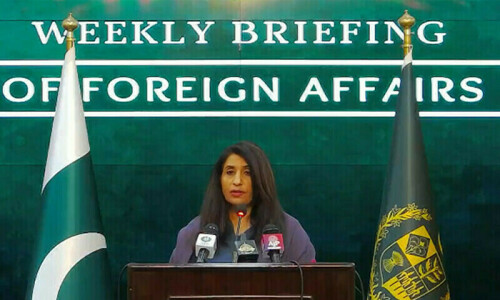ISLAMABAD: Although the civilian-led Intelligence Bureau (IB) has over the years run its operations under the shadow of the military-led Inter Services Intelligence (ISI), its success in collecting data on different militant wings operating in Karachi has proved handy in the recent successful operations.
Both on-and off-the-record discussions with former and serving officials of different law-enforcement agencies corroborate the fact that lack of collaboration between the two agencies had long been undermining effective operations against criminal elements.
Know more: Rangers raid MQM HQ in Karachi, detain member of Rabita Committee
But, they said, with the continuation of civilian governments in Islamabad, the IB had started strengthening its foothold and providing actionable intelligence to law-enforcers.
According to a senior official closely associated with IB’s operations, during the previous PPP government it had started building a consolidated databank on extortionists and targeted killers belonging to different religious and political parties operating in Karachi.
“Although no action was taken by the PPP government against these gangs because of political considerations, we kept following their activities and, in the process, gathered authentic statistics.”
Also read: Zardari stopped Rangers-like raid on ‘Nine Zero’: Mirza
As a result when in Sept 2013, the PML-N government decided to launch the operation in Karachi, the IB readily provided details of the affiliates of political parties involved in criminal activities.
According to the official, if political will prevails, Karachi’s situation can be effectively handled “as we have enough actionable intelligence at our disposal, including minute details of militant organisations and their sub-networks”.
“The initial success of the Karachi operation, which soon lost its intensity because of political considerations, is witness to the veracity of IB’s information,” he claimed.
Explaining how the IB had evolved into a functioning agency over the recent years, another official said that after General Parvez Musharraf’s years in power during which the agency played second fiddle to the ISI, the PPP government earmarked some resources for its operations. The incoming PML-N government continued equipping the IB with required tools.
A former senior official of the IB said that regular military interventions had led to the undoing of the IB, which until 1979 was considered a useful civilian spying entity. The agency fell prey to politicisation during 90s as successive PML-N and PPP governments influenced its operations to suit their interests.
Gen Musharraf deprived the IB of whatever resources it had, thereby making it a toothless agency, said the official.
Former interior secretary Tasneem Noorani (2001-2005) said that for obvious reasons Mr Musharraf had more confidence in the well- equipped ISI than the IB. As a result the latter was sent to the periphery and lost the opportunity of developing into a potent force. But he agreed that of late the IB had started making positive contributions.
In reply to a question, Mr Noorani said the raid on the headquarters of the Muttahida Qaumi Movement showed that the agencies had done adequate homework and were in possession of irrefutable evidence against those arrested.
On the lack of cooperation between the IB and ISI, which had long been considered as a hurdle in the way of effective intelligence operations, a senior police official, who had been posted in Karachi, said: “A healthy competition between the two agencies can yield a win-win situation. I am happy that the two agencies have started increasingly cooperating with each other.”
He said an effective IB could make a positive contribution to the success of the efforts to counter terrorism. “Although, the military-led Rangers are playing a leading role in reining in targeted killers in Karachi, there is no doubt that the IB has played a vital role in recent successes.”
“And this happens all over the world as countries do maintain multiple agencies but their actions end up in protecting their people,” he added.
Interior Minister Chaudhry Nisar Ali Khan, while launching the first internal security policy, duly mentioned “trust deficit between the two agencies”. But on Feb 4 he jubilantly informed the National Assembly about a rare cooperation between the ISI and the IB, which led to the foiling of a deadly suicide plan against people belonging to Shia Hazara community of Quetta.
Published in Dawn, March 16th, 2015
On a mobile phone? Get the Dawn Mobile App: Apple Store | Google Play














































